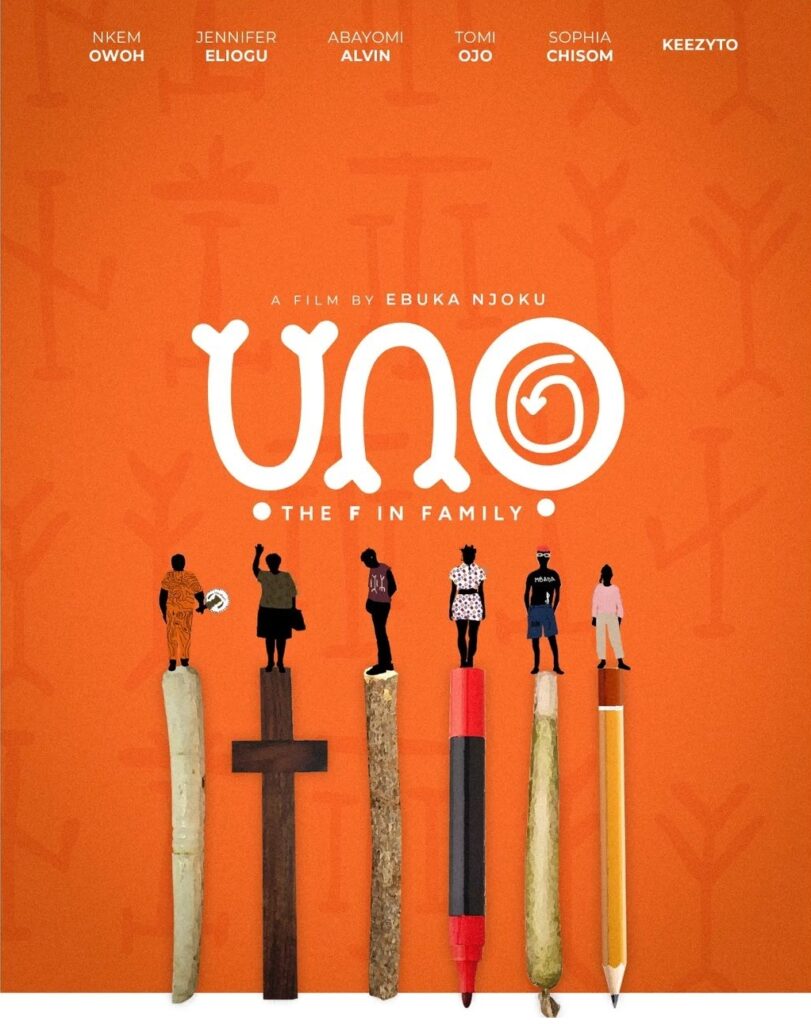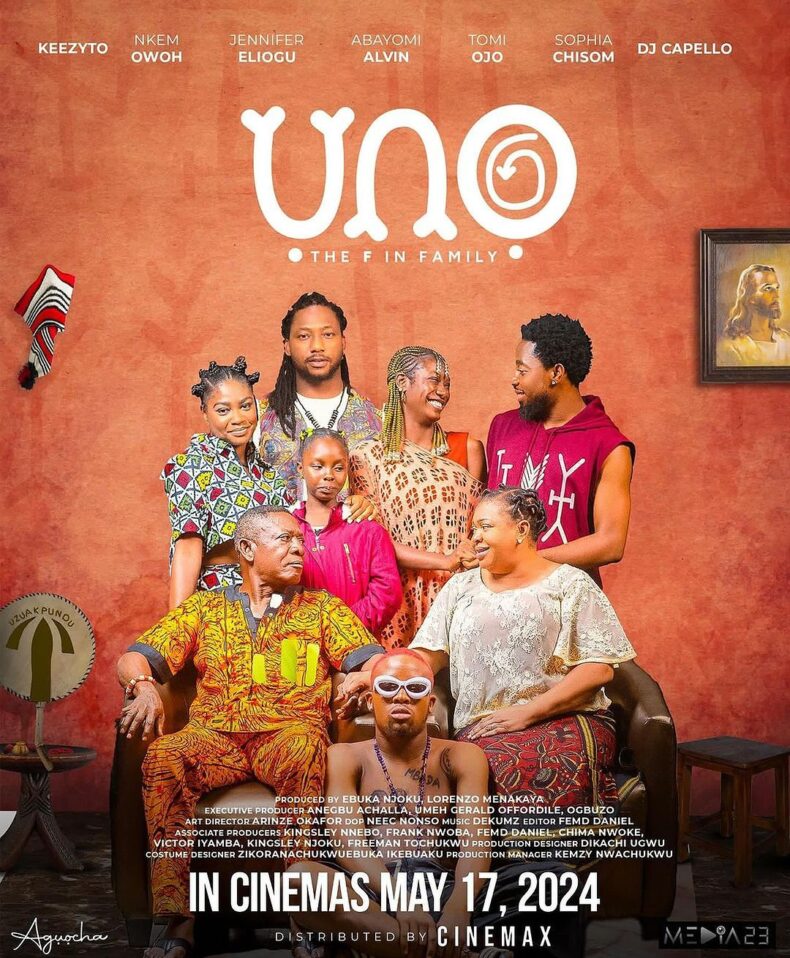ỤNỌ (The F in Family): A series of disjointed conversations
Nkem Owoh, Jennifer Eliogu, Keezyto, Sophia Chisom, Tomi Ojo, Abayomi Alvin, Dj Capello and Chimamanda Ukwueze.
The story follows Junior, who, at his girlfriend’s urging, travels from Lagos to Enugu to introduce her to his family. Over the course of a single day, Junior grapples with reconnecting with a family he has been estranged from for ten years, while also striving to win their acceptance of his girlfriend. Tensions rise, secrets come to light, and the family must navigate these challenges to find reconciliation.
2 hours
Ebuka Njoku
Ebuka Njoku and Lorenzo Menakaya
Ebuka Njoku
2024
The familial themes
The storytelling and performances
Uno (The F In Family) transports viewers to the vibrant heart of Enugu, in eastern Nigeria. The story follows Junior (played by Keezyto), who, at his girlfriend’s urging, travels from Lagos to Enugu to introduce her to his family. Over the course of a single day, Junior grapples with reconnecting with a family he has been estranged from for ten years, while also striving to win their acceptance of his girlfriend (played by Temi Ojo). Tensions rise, secrets come to light, and the family must navigate these challenges to find reconciliation.
The family in this movie is deeply dysfunctional, a rift originating from the eldest son leaving home after his father (Played by Nkem Owoh) refused to support his dream of becoming a comic book creator. This tension permeates every relationship, creating a web of conflict that has the parents clashing and siblings following suit.
The central theme of family strife is significant and resonates with the dynamics of many Nigerian homes. However, the way Uno delivers this message is flawed. The movie feels like a series of disjointed conversations, shifting from one duo to another, which quickly becomes tiring. This issue is compounded by the fact that the entire storyline unfolds in just one day, straining the plausibility of the numerous events and interactions that occur.
Emotional scenes in Uno lack impact. We’re faced with either the performers giving unconvincing performances or the scenes not being given enough time to develop. Big moments don’t just drop from nowhere, they need proper buildup, but in Uno, scenes erupt or escalate abruptly. A clear example is the contrived argument Ada and Kenny have (played by Sophia Chisom and Abayomi Alvin respectively). That scene can only be called cheap melodrama; conversations don’t go the way they did and the dialogue will only test audiences because the reply Kenny gives Ada that prompts the emotional flair won’t happen in real life. That’s not to say that the scene isn’t important, as it exists to delve into Ada as a person and her feelings but the problem lies with the route taken to get there.
Another issue with Uno is its tendency to tell rather than show. Given that the movie’s events unfold over a single day, frequent flashbacks through dialogue are somewhat understandable, though not ideal. The larger problem is with the delivery of the actors. Many times in this movie people say they’re hurt or try to express their hurt but they don’t convey it in any way other than their words, they deliver their lines and forget to show it in their expressions and body language. In turn, this greatly affects the authenticity of these scenes.
With the compressed timeline of Uno, unfolding entirely within a single day, the issues that are raised aren’t given room to breathe. Conflicts and emotional moments are introduced and resolved too quickly. The runtime of Uno is quite lengthy, which makes it perplexing that the film includes numerous filler moments while rushing through the crucial ones. This rushed pacing in specific places prevents the film from delving into the complexities of the issues it raises, resulting in resolutions that feel unearned.
Uno explores a variety of compelling themes and elements. It touches on intertribal relationships and the resistance many families still have towards them. The film also briefly addresses the lingering effects of the Nigerian civil war. Ada’s character is also an exploration of teenage pregnancies, how families cover them up, and Ada moving on from that situation (which is a subtle take on personal resilience.) Junior is also presented as the glue that keeps his family together (even though without much justification), as his absence leads to his family coming undone. His siblings resent him for shifting the focus away from them, with both of them finding their own ways of rebellion. The parents’ relationship also deteriorates, with Mr. Uzuakpundu succumbing to infidelity. What hammers the point that Junior serves as his family’s glue is how his sudden presence is able to heal all wounds and ultimately piece the family back together.
Other than the poor execution of the plot, the technical aspects can’t also be raved about. There are also continuity issues. For example, Ada’s daughter, Nneoma, goes to sleep after the reveal that Ada is her mother, and when Ada goes in to explain and apologize to her she doesn’t acknowledge her. But when Junior is about to leave Nneoma is awake and in the parlour, and there’s no hint that Ada and Nneoma have had a resolution, the filmmakers totally forget this piece of subplot.
Most of the performances in Uno are weak. Other than the seasoned actors, Nkem Owoh and Jennifer Eliogwu, the remaining cast members deliver inadequate performances. Keezyto, for most parts, delivers an uninteresting protagonist, there is no sense of urgency to the performance he gives. Temi Ojo has had better performances prior to this but Uno adds nothing to her repertoire. DJ Capello’s turn as a rebellious child is one of the weakest links in Uno; he smokes a lot in the movie and no single puff of his is convincing. Seeing how Sophia Chisom and Abayomi Alvin spend a lot of time together onscreen, their performances can just be lumped together as uninspiring.
In conclusion, while Uno attempts to tackle important themes, it ultimately falls short in execution. Despite its flaws, the film may still appeal to audiences looking for a glimpse into the complexities of family dynamics in contemporary Nigeria. However, for those seeking a polished and cohesive story, Uno may leave them wanting more.









